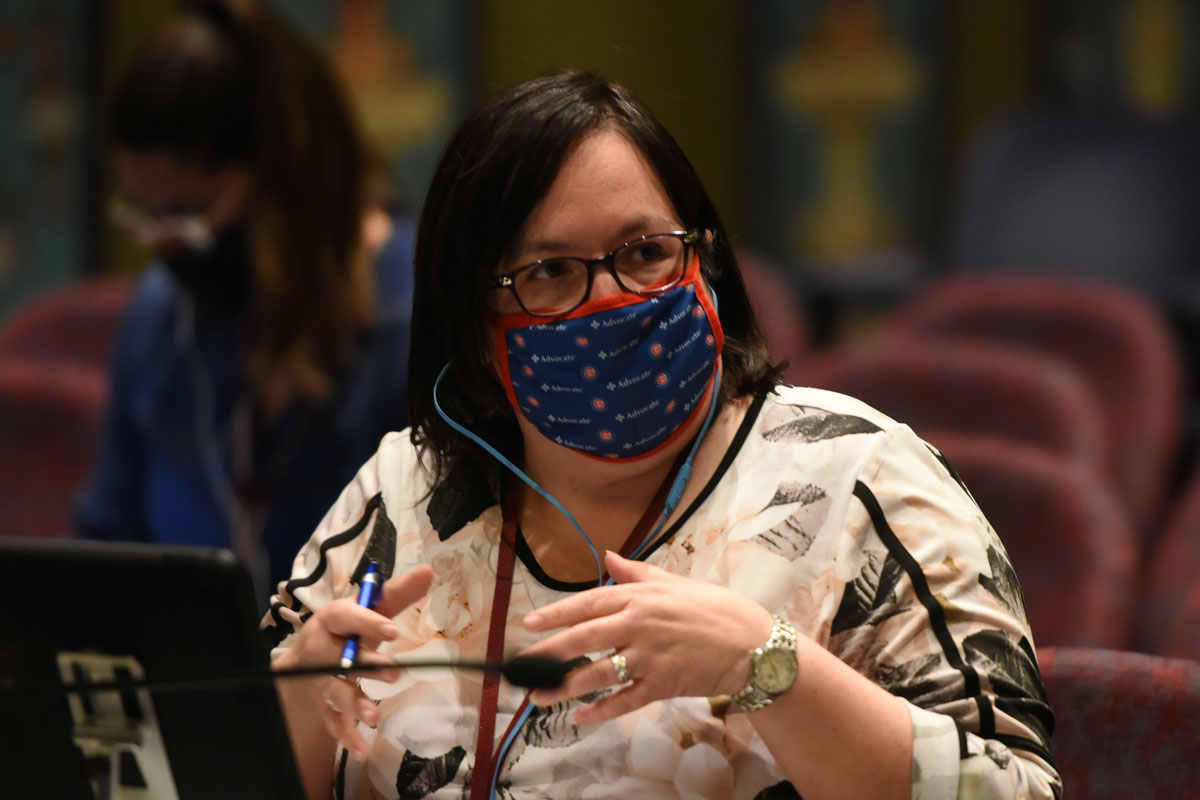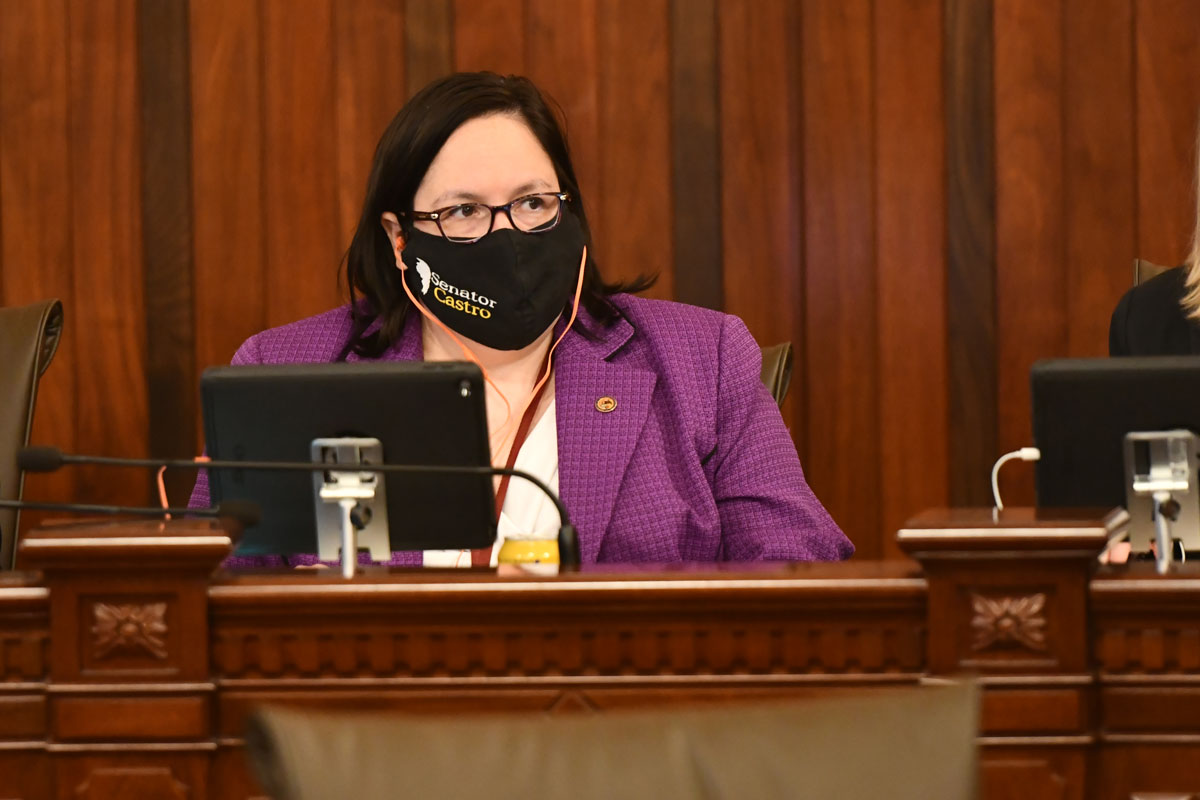- Details
- Category: Senator Cristina Castro News

SPRINGFIELD – State Senator Cristina Castro (D-Elgin) spearheaded a new law to create a program that will help people with serious mental illness or substance use disorders by enabling access to affordable housing and support services.
“Supporting those struggling the most in our communities is a top priority,” Castro said. “Taking a ‘Housing First’ approach to mental illness and addiction treatment will ensure that those most vulnerable are treated with dignity and compassion.”
Often, people with a serious mental illness or substance use disorder lack affordable housing, causing increased institutionalization, incarceration or risk of death from an overdose. This law creates the Housing is Recovery Pilot Program to help prevent people with a serious mental illness or people who are at high risk of overdose due to lack of support services from being institutionalized or dying.
Read more: Castro’s Housing is Recovery Pilot Program signed into law
- Details
- Category: Senator Cristina Castro News
 ELGIN – One of the nation’s top credit rating agencies, Fitch Ratings, recently updated its outlook on Illinois’ fiscal status, a move that State Senator Cristina Castro (D- Elgin) commends as a reflection of the state’s responsible spending.
ELGIN – One of the nation’s top credit rating agencies, Fitch Ratings, recently updated its outlook on Illinois’ fiscal status, a move that State Senator Cristina Castro (D- Elgin) commends as a reflection of the state’s responsible spending.
“Illinois’ outlook change shows how the actions we’ve taken over the last few years, as well as the balanced budget we passed this year, have improved our state’s finances,” Castro said. “Even with the pandemic, we’ve managed to fully fund our pensions and even increase K-12 education funding.”
Along with those successes, Illinois has also cut spending by nearly $1 billion since 2020 and reduced Illinois’ bill backlog to less than $200 million from a high of nearly $1 billion in 2017.
Two other credit rating agencies, Standard and Poor’s and Moody’s, also adjusted Illinois’ outlook to be reflective of the positive changes Illinois has undertaken.
“Fitch improving its rating outlook for Illinois is a good thing for taxpayers in the state,” Castro said. “If we stay on track, borrowing will cost less which will end up saving taxpayers money.”
Fitch’s full analysis is available here.
- Details
- Category: Senator Cristina Castro News

ELGIN – State Senator Cristina Castro (D- Elgin) released the following statement on the sentencing of Derek Chauvin, who was convicted of murdering George Floyd:
“I hope today’s sentencing brings a sense of peace to George Floyd’s family. While nothing will ever fix the loss of a loved one, I hope that knowing that the perpetrator is behind bars will bring some comfort to those who knew him.
“As we begin to move forward, I stand with many in calling for reform at the national level to ensure that tragedies like this are prevented.”
- Details
- Category: Senator Cristina Castro News
 ELGIN – To encourage young people to continue learning during the summer, State Senator Christina Castro (D-Elgin) is launching a Summer Reading Club for students in and around the Elgin area.
ELGIN – To encourage young people to continue learning during the summer, State Senator Christina Castro (D-Elgin) is launching a Summer Reading Club for students in and around the Elgin area.
“Summer vacation and other breaks from school can result in learning loss for students,” Castro said. “Students who continue reading during the summer are more likely to remain engaged and continue to do well in school.”
The Summer Book Club requires students to read eight books of their choice during the summer break, record the names of the books and return the form to Castro’s office by Aug. 11. Senator Castro will host a pizza party for those who finish the program.
“Reading helps students develop healthy minds,” Castro said. “This program will help them make reading into a habit and prepare them for the upcoming school year.”
Parents can visit senatorcristinacastro.com to download and print the book club form. They can also call Castro’s office at (847) 214-8864 to request a copy by mail.
Castro urges interested residents to call her office with any additional questions.
- Details
- Category: Senator Cristina Castro News
 ELGIN – State Senator Cristina Castro (D- Elgin) announced that local communities will be receiving more than $4.5 million in funding to improve local walking and bicycle paths.
ELGIN – State Senator Cristina Castro (D- Elgin) announced that local communities will be receiving more than $4.5 million in funding to improve local walking and bicycle paths.
“With the state opening back up and the weather getting warmer, more people will be spending their time outside enjoying recreational areas across our communities,” Castro said. “This funding will allow people to enjoy our bike and pedestrian paths safely and easily.”
Projects receiving funding through these awards are:
- Irving Park Road at Bartlett Road intersection,
- County Farm Road multi-use path,
- Streamwood IL 59 bicycle and pedestrian overpass, and
- Hassell Road Corridor pedestrian and bicycle facility enhancements
These projects are part of the Illinois Transportation Enhancement Program, for which the Illinois Department of Transportation has selected 99 projects totaling $105.7 million. Projects receiving funding in this round of investment include biking and walking paths, trails, streetscape beautification, and other projects designed to encourage safe travel across the various modes of transportation at the local level.
“From commuting to recreation, walking and bike paths play an important role in our communities,” Castro said. “I look forward to seeing the improvements this funding will bring.”
- Details
- Category: Senator Cristina Castro News
 SPRINGFIELD – State Senator Cristina Castro (D- Elgin) passed a measure to put an end to the demand for pets from inhumane breeding operations by requiring pet stores to source their animals from rescue shelters.
SPRINGFIELD – State Senator Cristina Castro (D- Elgin) passed a measure to put an end to the demand for pets from inhumane breeding operations by requiring pet stores to source their animals from rescue shelters.
“We’ve seen too many families purchase pets from a pet shop, only to take them home and find out they have a myriad of health issues,” Castro said. “Too often, pet shops source their animals from intensive breeding facilities that treat animals like objects instead of the living, breathing creatures they are.”
Read more: Castro champions measure to stop the puppy mill to pet shop pipeline
- Details
- Category: Senator Cristina Castro News
 SPRINGFIELD – State Senator Cristina Castro (D- Elgin) released the following statement after the passage of a budget for the 2022 Fiscal Year:
SPRINGFIELD – State Senator Cristina Castro (D- Elgin) released the following statement after the passage of a budget for the 2022 Fiscal Year:
“As we begin to take steps to recover from this past year, I’ve made it a priority to ensure that those most impacted by the pandemic get the resources they need to get back on their feet.
“Our schools took a big hit with the abrupt switch to online learning, so the $350 million in additional funding for education will provide a much-needed boost for our students and teachers. I am also glad to see money for local governments fully funded to give our communities flexibility when it comes to addressing local needs.
“Additionally, this year’s budget sets Illinois on the path of fiscal responsibility. As we pay off our bills this year and in the future, we can put more focus and funds on programs that will continue to benefit residents of our state.”
- Details
- Category: Senator Cristina Castro News
 SPRINGFIELD – State Senator Cristina Castro (D- Elgin), who has been a fierce advocate for government reform and established a joint commission on ethics in 2019, issued the following statement on the Senate Bill 539, a comprehensive ethics package that is on its way to the governor’s desk:
SPRINGFIELD – State Senator Cristina Castro (D- Elgin), who has been a fierce advocate for government reform and established a joint commission on ethics in 2019, issued the following statement on the Senate Bill 539, a comprehensive ethics package that is on its way to the governor’s desk:
“It’s no secret that Illinois has needed reform for some time. Addressing the legislator-to-lobbyist pipeline was a top priority, and I believe this legislation will play a big part in closing the loopholes that have allowed elected officials to hold office one day and lobby the next.
Read more: Castro: Ethics bill’s ‘No Exit’ provision is common sense
More Articles …
- Castro praises social equity changes to cannabis legislation
- Castro measure to provide housing and support to those with mental illnesses pass both chambers
- Castro announces local communities to receive more than $9 million in funding for road improvements
- Castro passes measure to address racial disparities in maternal mortality
Page 12 of 22













 © 2026 Illinois Senate Democratic Caucus
© 2026 Illinois Senate Democratic Caucus